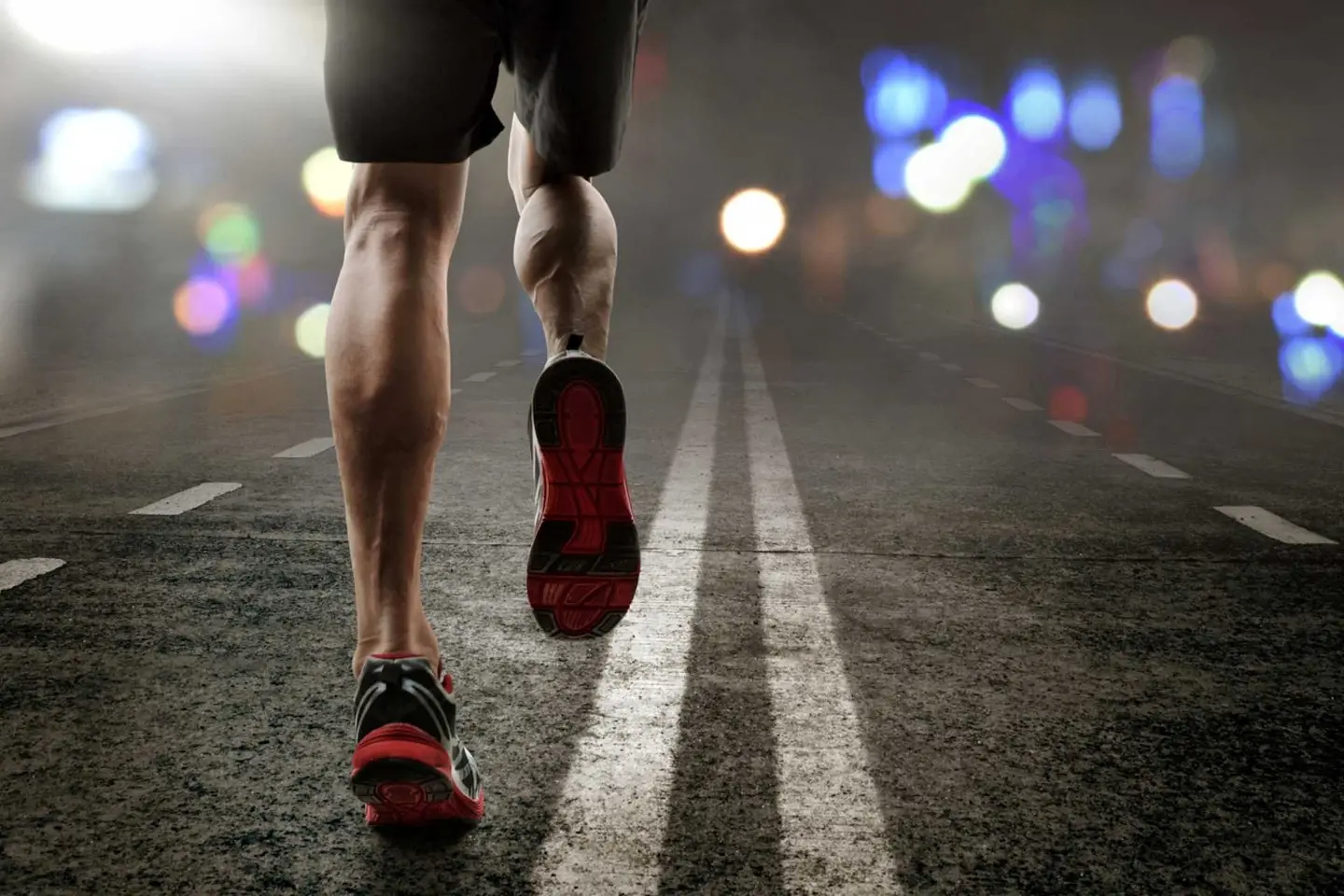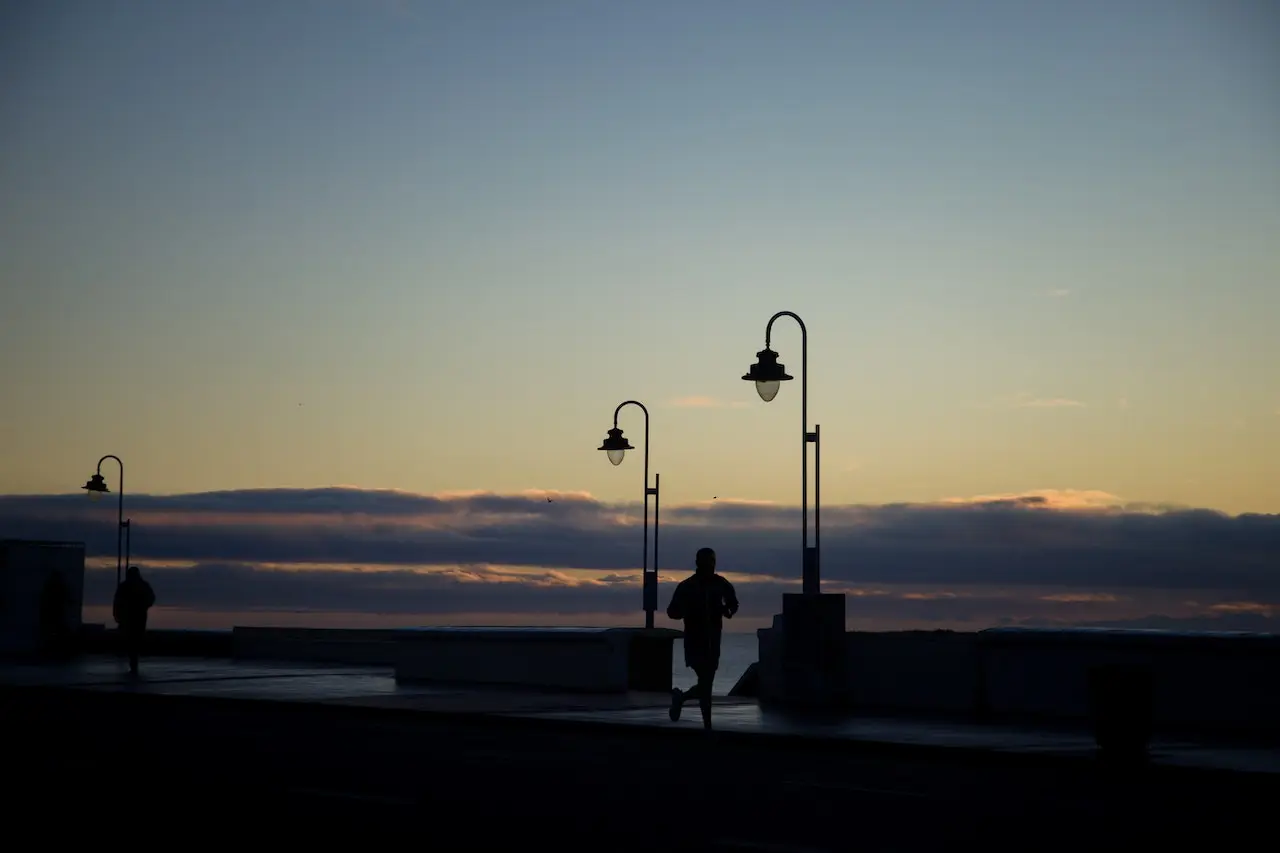Running at Night: Benefits and Useful tips
Running is a great activity with many health benefits, but sometimes our busy schedules make it difficult to exercise during the day. Running at night can be a convenient solution, but it does come with some challenges. Is it healthy to run at night? Is it safe to run at night? You may have many questions, but we have all the answers!
In this post, we will discuss the benefits of running at night and provide safety tips to help you stay safe on your nighttime runs. Let’s dive in!
Is it ok to do running at night?
Running at night can be an exciting way to switch up your routine and add variety to your exercise. However, safety should always be a top priority. Be sure to wear reflective clothing and carry a flashlight or headlamp. Stick to well-lit areas and avoid running alone.
4 Reasons Why People Run at Night
Some people prefer to run in the morning, while others prefer to run in the evening. However, some runners prefer to run at night, and some compelling reasons exist.

1. Better Sleep
One of the reasons why runners choose to run at night is because it can help them sleep better. This is because running releases endorphins, which help to reduce stress and anxiety, allowing your body to relax and fall asleep more easily. Running at night can help to tire out your body, making it easier to fall asleep at night.
2. Busy Day
Another reason runners choose to run at night is that they may have a busy schedule. For some people, running in the morning or during the day is not an option due to work or other commitments. Running at night allows them to fit in their workout after a busy day and stay on track with their fitness goals.
3. Cooler Temperature
Running in the heat of the day can be challenging and uncomfortable. However, running at night can relieve the heat, as temperatures tend to be cooler and more comfortable. This can make for a more enjoyable and comfortable run, making it easier to stick to your running routine.
4. Optimal Hours for Running at Night
While running before bed can be a great option, there are some optimal hours for running at night. Generally, running between 7 pm and 10 pm is recommended, as this is when your body is at its peak performance levels. Running at this time can help you to achieve your best performance, making it easier to reach your fitness goals.
4 Benefits of Running at Night
Now let’s discuss four benefits of running at night that you may not have known about.
1. Better Food Digestion
Running at night can help with better food digestion. After a meal, your body needs to break down the food and digest it properly. If you go for a run an hour after eating, it can help speed up the digestion process. Running increases blood flow, raising the rate at which your body can digest food. By running at night, you give yourself enough time to digest your food properly before bed, which can help prevent indigestion and weight gain.
2. Improved Sleep
Running at night can also help improve your sleep. Research has shown that physical activity can help regulate the body’s circadian rhythm, which controls our sleep-wake cycle. Running at night can help reset your body’s natural clock and promote better sleep. Additionally, it can help reduce stress and anxiety, common causes of sleep problems.
3. Stress Relief
Stress relief is another benefit of running at night. Running is a great way to release endorphins, natural mood boosters that can help reduce stress levels. Running at night can be particularly beneficial because it lets you clear your mind after a long day and release any built-up tension or frustration. It can help you feel more relaxed and calm before going to bed.
4. Hormonal Balance
Finally, running at night can help promote hormonal balance. Physical activity has been shown to increase the production of certain hormones, such as growth hormone and testosterone. These hormones are important for muscle growth, repair, and overall health. By running before bed, you can help promote the production of these hormones and improve your overall hormonal balance.
3 Disadvantages of Running at Night
Running at night can be a great way to stay active when you don’t have time during the day. However, there are some disadvantages and risks that runners should be aware of. Here are three main disadvantages and risks of running at night.
1. Reduced Visibility
One of the biggest risks of late running is reduced visibility. Even if you are running in a well-lit area, it can be difficult to see hazards such as potholes, uneven pavement, or obstacles on the road. This can lead to falls, twisted ankles, or other injuries. Additionally, drivers may have a harder time seeing you, especially if you are wearing dark clothing.
2. Increased Danger
Running at night can increase the danger of being attacked or mugged. Criminals are more likely to target runners who are alone and may be distracted by music or other factors. It is important to be aware of your surroundings and avoid running in isolated areas at night.
3. Temperature and Weather Changes
Another disadvantage of running at night is changing temperature and weather conditions. The temperature can drop quickly as the sun goes down, and you may not be prepared for the sudden change. Additionally, rain or snow can make running conditions dangerous, especially if you are running on slippery surfaces.

How to Run at Night: 2 Life-saving Rules for Running in the Dark
Is it safe to run at night? If you’re one of those runners who prefer a late night run, you need to learn some of the best tips for running in the dark, including traffic rules, choosing lighted streets, and wearing special gear.
1. Traffic Rules
First and foremost, it’s important to follow traffic rules when running at night. This means running on the sidewalk or running against traffic if no sidewalk is available. This allows you to see oncoming traffic and react accordingly. It’s also important to obey traffic signals and crosswalks. Remember, safety should always come first.
2. Lighted Streets
When running at night, it’s important to choose well-lit streets. This allows you to see where you’re going and helps drivers see you. Avoid poorly lit areas, such as dark alleys or unlit parks, as these can be dangerous. If you’re running in an area with limited lighting, consider wearing a headlamp to help you see the path ahead.
Subscribe to Our Running Newsletter!
Get free running tips from renowned professional athletes and discounts from top-notch brands.
3 Tips on Clothing and Equipment for Running at Night
Let’s move to the three main tips on clothing and equipment for running at night.
1. Wear Reflective Clothing
Wearing reflective clothing is essential when running at night. It helps you stay visible to drivers and other pedestrians who might be sharing the road with you. It’s best to wear light-colored clothing with reflective strips or patches. You can also add reflective tape to your clothing or shoes to increase your visibility. When choosing your clothing, look for breathable and moisture-wicking fabrics to keep you comfortable during your run.
2. Take a Headlamp or Flashlight
Running at night gear is a must-have for your safety. It’s important to see where you are going and to be able to spot any obstacles in your path. A headlamp might be enough to light your way if you are running in an area with street lights. However, a flashlight might be necessary if you are running in a dark area. Choose a headlamp or flashlight with a bright beam and long battery life.
3. Carry ID and a Phone
It’s always a good idea to carry identification and a phone when running at night. In an emergency, you need to be able to call for help and have your identification on hand. You can carry your ID and phone in a waistband or armband. Some running clothes also have pockets that can hold your phone and ID.
3 Things to Avoid when Running at Night?
Running at night can be a great way to stay active and enjoy the fresh air after a long day, but it’s important to take safety precautions. While it’s crucial to wear reflective clothing and carry a flashlight, there are also some things you should avoid doing. Here are three things not to do when running in the evening.
1. Don’t Wear Headphones
Music can be a great motivator during runs, but wearing headphones can be dangerous when running at night. When you can’t hear your surroundings, you may not be able to hear approaching cars or other potential hazards. It’s also important to be aware of your surroundings and alert to potential danger. If you must listen to music, keep the volume low and use only one earbud so you can stay aware of your surroundings.
2. Don’t Run Alone
Running alone at night can be dangerous, especially in an unfamiliar area. If possible, run with a friend or join a running group. Not only is it safer to run with others, but it can also be more enjoyable. If you run alone, tell someone where you’re going and when you expect to return.
3. Don’t Run in Dark or Isolated Areas
Running in dark or isolated areas can put you at risk for potential danger. Stick to well-lit areas and popular running routes. Avoid areas with little foot traffic, even if they’re well-lit. If you’re running in an unfamiliar area, research the route and avoid any areas that may pose a threat. It’s better to be safe than sorry.
Is it Better to Run in the Morning or at Night?
Let’s compare the benefits and drawbacks of running at night vs morning.
Morning Runs
Many runners prefer to start their day with a morning run. One of the advantages of running in the morning is that it sets a positive tone for the day ahead. Morning runners often feel energized and focused after their run, which can help them be more productive throughout the day. Additionally, running in the morning can help you establish a consistent routine, which can benefit overall fitness and health.
Pros
- Running in the morning can boost your metabolism and energy levels.
- Morning runs can help you start your day positively and improve your mood.
- It can help you establish a consistent workout routine.
Cons
- Waking up early to go for a run can be challenging, especially if you are not a morning person.
- Your body may not be fully awake and ready to perform at its best.
- You may have to deal with traffic and crowded running trails during peak morning hours.

Night Runs
On the other hand, some runners prefer to run at night. One advantage of a late night run is that it can be a great way to unwind after a long day at work. Many people find that running at night can help them clear their minds and relieve stress. Additionally, running in the evening can be more convenient for people who have busy schedules during the day.
Pros
- Running at night can help you relieve stress and relax after a long day.
- You may have more energy and endurance at night, as your body has been active throughout the day.
- Jogging at night can provide a sense of calm and solitude, as many people are indoors during this time.
Cons
- Night runs can be dangerous if you are running in poorly lit areas or unfamiliar neighborhoods.
- Your body temperature drops at night, making warming up and preventing injuries more challenging.
- Running late at night can interfere with your sleep patterns and make it harder to fall asleep.
Whether you run in the morning or at night depends on your preference and lifestyle. Both options have their benefits and drawbacks, and it ultimately comes down to what works best for you and your fitness goals.
Frequently Asked Questions about Running at night
How Late at Night Can I Run?
It’s important to stay safe while enjoying a night run. The ideal time for running is during daylight hours, but if you must run at night, it’s best to do so earlier in the evening. Avoid running after 10 pm, when visibility is low, and there’s a higher risk of encountering dangerous situations. Remember to wear reflective clothing and to stick to well-lit areas.
Where to Run at Night?
If you enjoy running at night, finding a safe and well-lit route is essential. Choose a path you’re familiar with and free from hazards. Avoid running in isolated areas, and stay visible by wearing reflective clothing. Remember to carry a flashlight or headlamp to illuminate your path.
Final thoughts on Running at Night
In summary, running at night can be convenient and enjoyable for staying fit. With the right precautions, you can stay safe while reaping the benefits of cooler temperatures, less crowded roads, and stress relief.
Running at night can offer a peaceful and calming environment, fresher air, and comfort without the summer heat. However, you must take precautions to ensure safety, such as wearing reflective clothing, carrying a flashlight, avoiding isolated areas, and running with a group or friend. Trusting your instincts and being aware of your surroundings can also help ensure safety while enjoying the benefits of running at night. Stay fit, but be safe!
Have you ever tried running at night? Please share your experience in the comments below.
Also read:
- How Many Miles Should I Run a Day
- How to Run a Faster Mile
- Do I Need to Fuel During a Half Marathon
- Average Human Running Speed
- 7 Minute Mile
- Benefits of Running With a Weighted Vest
- Does Running Make Your Butt Bigger
- Best Running Shoes For Achilles
- Running After Leg Day
- Do Nikes Run Big or Small
References:
- The effect of night-time exercise on sleep architecture among well-trained male endurance runners // PubMed: https://pubmed.ncbi.nlm.nih.gov/31821667/
- High-intensity exercise in the evening does not disrupt sleep in endurance runners // PMC: https://www.ncbi.nlm.nih.gov/pmc/articles/PMC6989626/
- What Are Good Situations for Running? A Machine Learning Study Using Mobile and Geographical Data // PMC: https://www.ncbi.nlm.nih.gov/pmc/articles/PMC7820721/
- Running Together: How Sports Partners Keep You Running // PMC: https://www.ncbi.nlm.nih.gov/pmc/articles/PMC8966768/
- Morning and evening exercise // PMC: https://www.ncbi.nlm.nih.gov/pmc/articles/PMC5481716/
If you have any questions or suggestions, you can contact us via email – [email protected]






